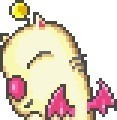「そんな私がだ」? ____がだ? I don't think I've never noticed が particle followed by だ before.… - Feed Post by mog86uk
「そんな私がだ」? ____がだ?
I don't think I've never noticed が particle followed by だ before. Sure there's だが (ですが), which would kind of fit. And, although Tomoko-chan does use だが quite a lot, I'm certain this is not simply a typo. Anyone?
I saw this a couple of days ago when I while reading a free preview of a manga online. Since it's a free preview, it shouldn't hurt too much to post this a small image of it, but if you want to read it in a bit more context, see the link below. On that page, click the "立ち読み(40ページ)" button, then click "ブラウザで読む". This was on page 6. ^^
http://www.ebookjapan.jp/ebj/154784/

I don't think I've never noticed が particle followed by だ before. Sure there's だが (ですが), which would kind of fit. And, although Tomoko-chan does use だが quite a lot, I'm certain this is not simply a typo. Anyone?
I saw this a couple of days ago when I while reading a free preview of a manga online. Since it's a free preview, it shouldn't hurt too much to post this a small image of it, but if you want to read it in a bit more context, see the link below. On that page, click the "立ち読み(40ページ)" button, then click "ブラウザで読む". This was on page 6. ^^
http://www.ebookjapan.jp/ebj/154784/

posted by mog86uk May 16, 2016 at 12:08am
Comments 16
 I've never heard that either I wonder if it was a mistake and they forgot to mention what they were recognizing with the が particleMay 16, 2016 at 9:24am
I've never heard that either I wonder if it was a mistake and they forgot to mention what they were recognizing with the が particleMay 16, 2016 at 9:24am @Ghosts, Since particles mark the thing that comes before them (not what comes after them), the thing being recognised (as you described it) by が is 「そんな私」. I understand what you were getting at though—that maybe they forgot the thing that they meant to write between が and だ.
@Ghosts, Since particles mark the thing that comes before them (not what comes after them), the thing being recognised (as you described it) by が is 「そんな私」. I understand what you were getting at though—that maybe they forgot the thing that they meant to write between が and だ.
However, I definitely think they did this intentionally rather than it being a mistake. But it doesn't seem like websites or books on Japanese grammar explain this at all...May 16, 2016 at 10:03am Yeah I've been trying to find something that covers this topic for a whileMay 16, 2016 at 10:46am
Yeah I've been trying to find something that covers this topic for a whileMay 16, 2016 at 10:46am I had an idea to check what she says in the anime for that scene. She says exactly the same thing!
I had an idea to check what she says in the anime for that scene. She says exactly the same thing!
http://www.crunchyroll.com/watamote-no-matter-how-i-look-at-it-its-you-guys-fault-im-not-popular/episode-1-since-im-not-popular-ill-change-my-image-a-bit-641805
"そんなわたしがだ らいげつから じょしこうせいだ!" (@1:22)
So this rules out any idea that there was just some kind of mistake. ^^May 17, 2016 at 2:33am maybe が is a word since rikaikun gives が a list of readings
maybe が is a word since rikaikun gives が a list of readings
it may be like how Naruto signs off his sentences with だってばよ even though it means nothing.May 17, 2016 at 3:10am ひさしぶり、I believe that it basically is just omitting the topic that would have been placed after the が because when it comes to が it marks the subject of the sentence and emphasizes what comes before it. So I think it could have been said like, "そんな私がモテないだ。来月から。。。女子高生!。" Which I would translate something like, "That "I" was unpopular, from next month onward I am a high school student!". I assume the JK part is abbreviated 女子高生. I've been reading an incredibly useful book called "Making Sense of Japanese" by Jay Rubin and it goes into amazing detail when it comes to a lot of things that seem unclear in some text books including what he calls "zero pronouns" which is something like what happened here where it is inferred the reader knows they are still talking about the topic marked by は so it's unnecessary to repeatedly state it. Now I could be completely off base here and be completely wrong but this is how I understand it. I appreciate any corrections from anyone to what I said ^_^May 18, 2016 at 5:16pm
ひさしぶり、I believe that it basically is just omitting the topic that would have been placed after the が because when it comes to が it marks the subject of the sentence and emphasizes what comes before it. So I think it could have been said like, "そんな私がモテないだ。来月から。。。女子高生!。" Which I would translate something like, "That "I" was unpopular, from next month onward I am a high school student!". I assume the JK part is abbreviated 女子高生. I've been reading an incredibly useful book called "Making Sense of Japanese" by Jay Rubin and it goes into amazing detail when it comes to a lot of things that seem unclear in some text books including what he calls "zero pronouns" which is something like what happened here where it is inferred the reader knows they are still talking about the topic marked by は so it's unnecessary to repeatedly state it. Now I could be completely off base here and be completely wrong but this is how I understand it. I appreciate any corrections from anyone to what I said ^_^May 18, 2016 at 5:16pm Freakymrq! ほんまにひさしぶり! I was beginning to wonder if after your trip to Japan this Christmas you liked it so much that you ended up staying there, and maybe you needed to keep a low profile to stop immigration catching you or something. :P
Freakymrq! ほんまにひさしぶり! I was beginning to wonder if after your trip to Japan this Christmas you liked it so much that you ended up staying there, and maybe you needed to keep a low profile to stop immigration catching you or something. :P
Yeah, from the start I was guessing something along those lines. I purposely didn't mention my thoughts on what it might be, because I didn't want to influence the kind of answers I might get, to make sure people gave their own ideas instead of simply adding onto my own potentially wrong view.
However, Tomoko-chan actually thinks she is already popular when she said this (possibly in denial). The anime makes it even more clear if I add the line she says immediately before this scene.
audio:「私はモテる!」
sub: "I am popular!"
audio:「そんな私がだ 来月から…」
sub: "And starting next month, I'll be..."
audio:「女子高生だ!」
sub: "A high school girl!"
I've actually read most of that book you mentioned, btw. Was quite a long time ago, but I liked it a lot. It's extremely good for getting inquisitive learners of Japanese thinking along the right track about certain grammar points. ^^May 20, 2016 at 5:05am Heh, I had a lot of fun during my trip to Japan but alas I'm back in my humble abode back in the states :P I've seen clips of that anime/manga before but looks like I obviously didn't know it well enough. I think I saw モテない somewhere on the previous page and went with that lol.May 20, 2016 at 5:58am
Heh, I had a lot of fun during my trip to Japan but alas I'm back in my humble abode back in the states :P I've seen clips of that anime/manga before but looks like I obviously didn't know it well enough. I think I saw モテない somewhere on the previous page and went with that lol.May 20, 2016 at 5:58am So just talked to my Japanese wife about it and the だ is only there for emphasis. I am guessing she is talking about herself prior to this line and the だ implies that all of that has led to this moment. My wife said it would still be correct without the だ but not nearly as strong a meaning.May 21, 2016 at 7:33am
So just talked to my Japanese wife about it and the だ is only there for emphasis. I am guessing she is talking about herself prior to this line and the だ implies that all of that has led to this moment. My wife said it would still be correct without the だ but not nearly as strong a meaning.May 21, 2016 at 7:33am @shirokitsune, Thank you so much for posting what you found out! And thank you to your wife too! That is very helpful. ^^
@shirokitsune, Thank you so much for posting what you found out! And thank you to your wife too! That is very helpful. ^^
When I had been looking around on Imabi for clues about my question, the only small piece of information I could find was quite similar to that.
http://www.imabi.net/l35thecopulaii.htm
If you scroll down to example sentence #9, the sentence has a similar use of だ. It happens to have a "grammar note" below the sentence, briefly mentioning about it:
"Here, the copula is used as a filler word. The same can be done with です."
I'm not completely sure whether that Imabi example is the same situation as my one though. Maybe, in cases like that it is being used as an idle filler word, but in other cases like mine this filler usage of the copula carries more of an emphasis adding purpose.
I'm still wondering about the more technical side behind the grammar—how exactly is it achieving this emphasis—like what the だ is actually linking (something left unsaid; something said not in standard sentence order; nothing at all)? But, even if I don't come across these answers, I feel like I can at least my mind can stop dwelling on this question now. Thanks. ^^May 21, 2016 at 9:12am
 The kana were switched in the posting versus the picture!May 29, 2016 at 4:10am
The kana were switched in the posting versus the picture!May 29, 2016 at 4:10am だが is similar to しかし
だが is similar to しかし
May 29, 2016 at 4:37am @JACKBOSMA,
@JACKBOSMA,
—Reply to first post: Learning about the copula だ (である) / です is one of the first things you learn in Japanese grammar. I can't see anything useful to my question in that link. (?)
—Reply to second post: I posted がだ every single time, except when I was explaining that I was certain the 漫画家 didn't make a typo of だが... The picture also says がだ. So they're both the same way round. Not sure what you mean?
—Reply to third post: I know what だが is, since I was explaining about it in my original post...May 29, 2016 at 5:09am JACKBOSMA, Thanks for taking the time anyway though. ^^May 29, 2016 at 5:10am
JACKBOSMA, Thanks for taking the time anyway though. ^^May 29, 2016 at 5:10am I learned a lot from the previous posts and appreciate the detailed responses.
I learned a lot from the previous posts and appreciate the detailed responses.
May 29, 2016 at 7:00pm
